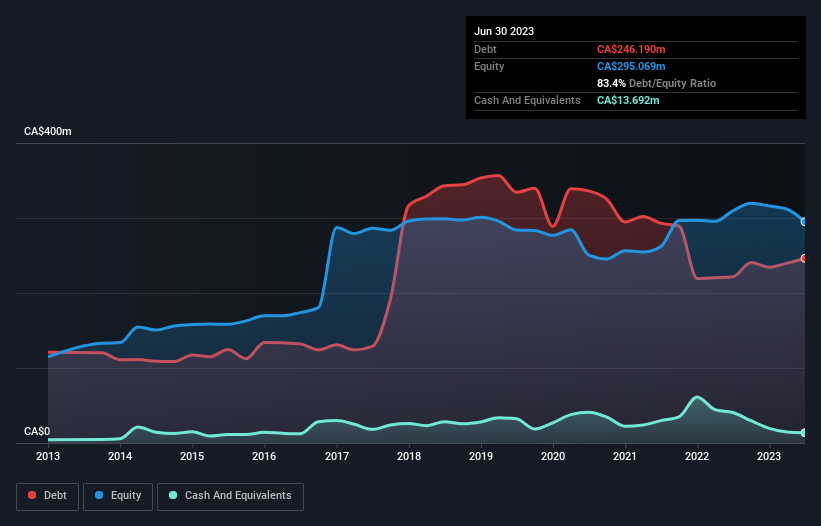Some say volatility, rather than debt, is the best way to think about risk as an investor, but Warren Buffett famously said that 'Volatility is far from synonymous with risk.' So it seems the smart money knows that debt - which is usually involved in bankruptcies - is a very important factor, when you assess how risky a company is. As with many other companies Skyline Investments Inc. (TLV:SKLN) makes use of debt. But should shareholders be worried about its use of debt?
Why Does Debt Bring Risk?
Generally speaking, debt only becomes a real problem when a company can't easily pay it off, either by raising capital or with its own cash flow. Part and parcel of capitalism is the process of 'creative destruction' where failed businesses are mercilessly liquidated by their bankers. However, a more usual (but still expensive) situation is where a company must dilute shareholders at a cheap share price simply to get debt under control. Of course, the upside of debt is that it often represents cheap capital, especially when it replaces dilution in a company with the ability to reinvest at high rates of return. The first thing to do when considering how much debt a business uses is to look at its cash and debt together.
Check out our latest analysis for Skyline Investments
How Much Debt Does Skyline Investments Carry?
You can click the graphic below for the historical numbers, but it shows that as of June 2023 Skyline Investments had CA$246.2m of debt, an increase on CA$221.7m, over one year. On the flip side, it has CA$13.7m in cash leading to net debt of about CA$232.5m.

How Healthy Is Skyline Investments' Balance Sheet?
We can see from the most recent balance sheet that Skyline Investments had liabilities of CA$58.7m falling due within a year, and liabilities of CA$253.0m due beyond that. Offsetting these obligations, it had cash of CA$13.7m as well as receivables valued at CA$22.7m due within 12 months. So its liabilities total CA$275.3m more than the combination of its cash and short-term receivables.
The deficiency here weighs heavily on the CA$109.0m company itself, as if a child were struggling under the weight of an enormous back-pack full of books, his sports gear, and a trumpet. So we'd watch its balance sheet closely, without a doubt. After all, Skyline Investments would likely require a major re-capitalisation if it had to pay its creditors today. When analysing debt levels, the balance sheet is the obvious place to start. But it is Skyline Investments's earnings that will influence how the balance sheet holds up in the future. So if you're keen to discover more about its earnings, it might be worth checking out this graph of its long term earnings trend.
Over 12 months, Skyline Investments made a loss at the EBIT level, and saw its revenue drop to CA$136m, which is a fall of 5.0%. We would much prefer see growth.
Caveat Emptor
Importantly, Skyline Investments had an earnings before interest and tax (EBIT) loss over the last year. Indeed, it lost CA$2.3m at the EBIT level. Combining this information with the significant liabilities we already touched on makes us very hesitant about this stock, to say the least. That said, it is possible that the company will turn its fortunes around. But we think that is unlikely, given it is low on liquid assets, and burned through CA$50m in the last year. So we consider this a high risk stock and we wouldn't be at all surprised if the company asks shareholders for money before long. There's no doubt that we learn most about debt from the balance sheet. However, not all investment risk resides within the balance sheet - far from it. To that end, you should learn about the 3 warning signs we've spotted with Skyline Investments (including 1 which is a bit unpleasant) .
Of course, if you're the type of investor who prefers buying stocks without the burden of debt, then don't hesitate to discover our exclusive list of net cash growth stocks, today.
New: Manage All Your Stock Portfolios in One Place
We've created the ultimate portfolio companion for stock investors, and it's free.
• Connect an unlimited number of Portfolios and see your total in one currency
• Be alerted to new Warning Signs or Risks via email or mobile
• Track the Fair Value of your stocks
Have feedback on this article? Concerned about the content? Get in touch with us directly. Alternatively, email editorial-team (at) simplywallst.com.
This article by Simply Wall St is general in nature. We provide commentary based on historical data and analyst forecasts only using an unbiased methodology and our articles are not intended to be financial advice. It does not constitute a recommendation to buy or sell any stock, and does not take account of your objectives, or your financial situation. We aim to bring you long-term focused analysis driven by fundamental data. Note that our analysis may not factor in the latest price-sensitive company announcements or qualitative material. Simply Wall St has no position in any stocks mentioned.
About TASE:SKLN
Low risk and slightly overvalued.
Similar Companies
Market Insights
Community Narratives



